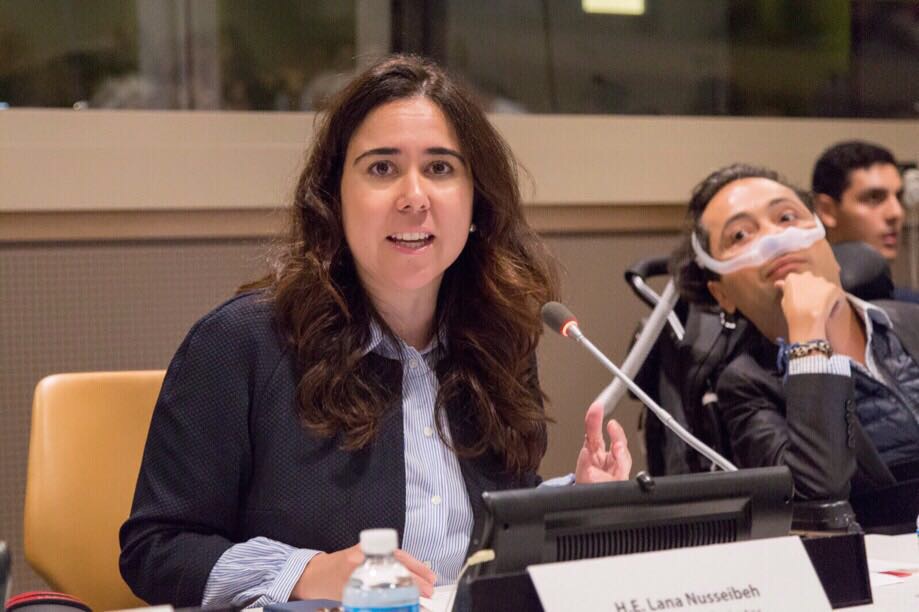NEW YORK — The United Arab Emirates has organised two panel discussions at the United Nations during its participation in the 10th Conference of State Parties to the Convention on the Rights of Persons with Disabilities, CRPD, in cooperation with Dr. Victor Pineda, President of Pineda Foundation and World Enabled.
The panel focused on women, children, and adolescents, and disability in humanitarian emergencies and using information and communications technology, ICT, to promote innovation and inclusion in urban centres.
The UAE Permanent Mission to the UN organised a panel, titled, “Access and Dignity Displaced: Women, Adolescents and Children with Disabilities in Humanitarian Emergencies” with the Permanent Mission of Norway to the UN and World Enabled. The discussion focused on gender and disability narratives in humanitarian planning and response, addressing the need for and delivery of services for persons that are most likely to be left behind.
The State Secretary and Deputy Minister of the Ministry of Children and Equality of Norway, Kai Morten-Terning, and Ambassador Lana Zaki Nusseibeh, UAE’s Permanent Representative to the United Nations in New York, delivered opening remarks at the event.

Ambassador Nusseibeh highlighted the UAE’s National Policy for the Empowerment of Persons with Disabilities, which was launched in April 2017 by Vice President, Prime Minister and Ruler of Dubai, His Highness Sheikh Mohammed bin Rashid Al Maktoum. She echoed His Highness’s words describing persons with disabilities as “people of determination”, and underscored that disability is not a limiting factor for any individual in achieving their goals.
Other speakers at the panel included Walton Webson, Ambassador and Permanent Representative of Antigua and Barbuda to the UN, Abraham Abdallah from International Disability Alliance, Sarah Costa, Executive Director of the Women’s Refugee Commission, Jolly Acen from the National Union of Women with Disabilities of Uganda, and Dr. Pineda. This was also the fifth panel of the Every Woman Every Child Everywhere panel series, organised by the UAE Mission.
The UAE Mission hosted a second event with the Permanent Mission of India to the UN, World Enabled, and G3ict on smart cities and promoting access to ICT tools to all citizens.
Lana Nusseibeh and Navreet Singh Kang, Secretary of the Department for Empowerment of Persons with Disabilities in the Indian Ministry of Social Justice and Empowerment, delivered opening remarks.
Ms. Nusseibeh reiterated UAE’s commitment to drive the implementation of Sustainable Development Goal 11 and the New Urban Agenda, which promises to make cities inclusive, safe, resilient, and sustainable. She also highlighted the “UAE’s vision for smart cities seeks to integrate technology to enhance inclusive transformation and effectively address the challenges faced by citizens.”
Dr. Ahmed Al Omran, Chairman of the Advisory Council of People with Determination in the Department of Policies and Strategies for Sustainable Development at the Executive Council of Dubai, stressed the importance of developing comprehensive policies to enable persons with disabilities to have equal access to digital content with all citizens.
“In order for smart cities to achieve access it is necessary to implement internationally adopted standards for access to all platforms and sources of information, as well as develop legislative frameworks to compel all sectors to implement these standards, initiatives to facilitate access, and a mechanism to assess progress in enhancing access to digital content,” Dr. Al Omran stated.
Dr. Salem Al Shafei, Director of Policies and Programmes for the Rights of Persons with Disabilities at the General Secretariat of the Executive Council of Dubai, highlighted the important role of ICTs in achieving real integration of people with disabilities in various aspects of everyday life and enabling them to achieve their goals in a comprehensive environment. Fatima Al Jassim, UAE youth delegate to CRPD, was also engaged in the conversation, discussing the cultural buy-in aspect of smart city development.
The panel was moderated by Dr. Pineda and James Thurston, Vice President of G3ict. Other panelists included Commissioner Victor Calise of New York City Mayor’s Office for Persons with Disabilities, Deepti Samant Raja of, World Bank, and Megan Lawrence, an Accessibility Evangelist for Microsoft.
